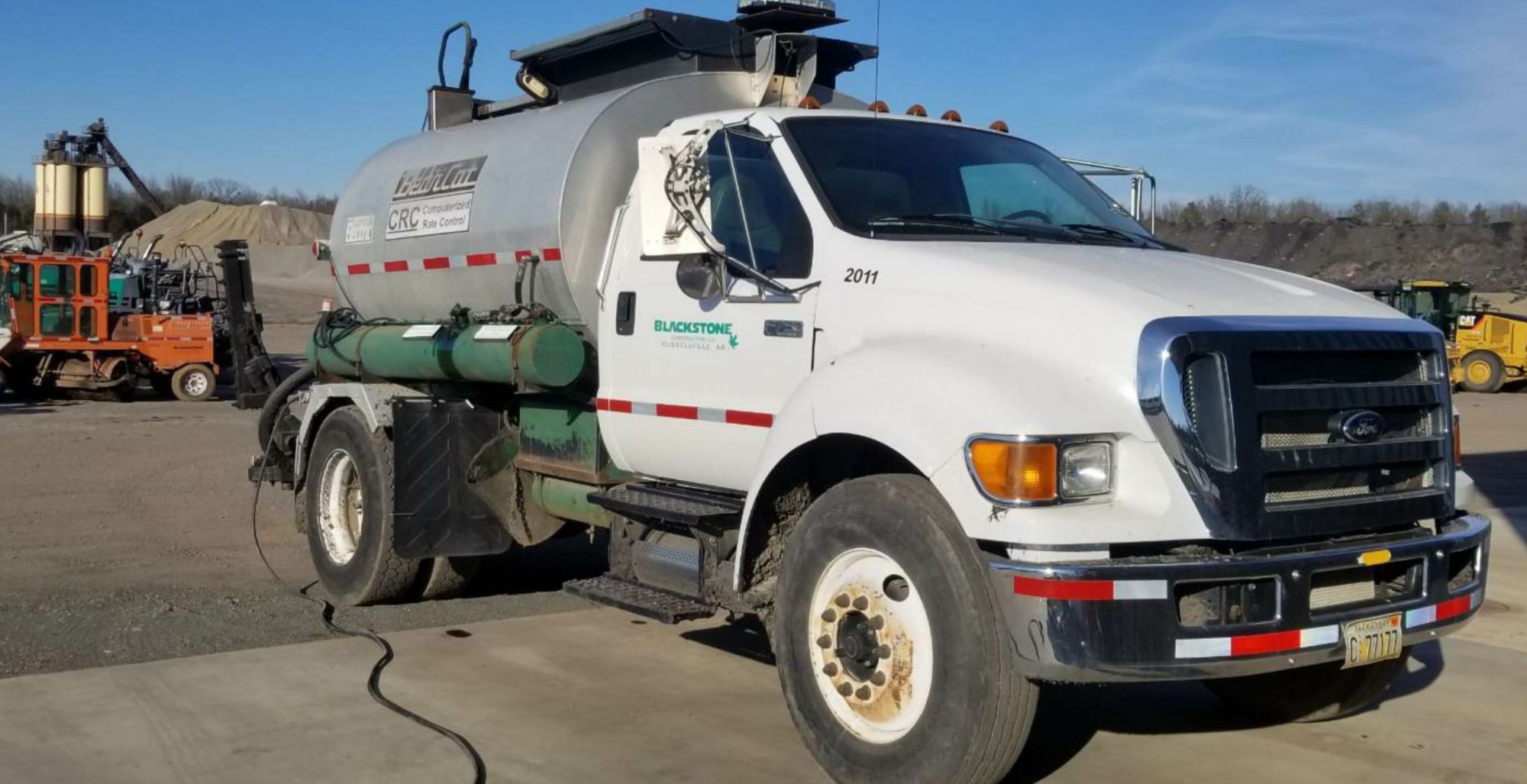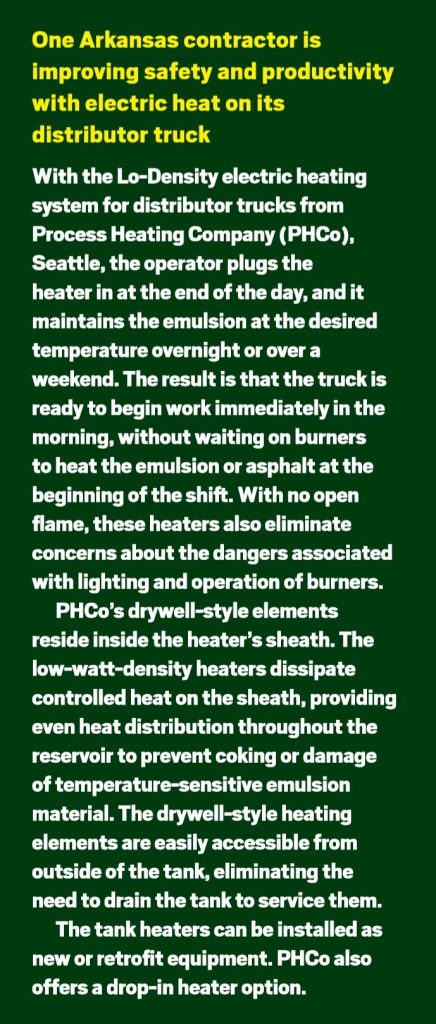Blackstone Outfits Tack Trucks with Electric Heat
BY Rick Jay

Blackstone Construction LLC outfits its BearCat E-Tack distributor truck with a Lo-Density® low-watt-density Rigid Tubular Drywell Tank electric heater from Process Heating Company (PHCo).
Stephen Baughn remembers helping out his father on a paving project a number of years ago when a distributor truck exploded because of vapors produced by the flame used to heat the asphalt.
“This was back in the 1970s before emulsion was used,” Baughn pointed out. He’s now a construction manager with Blackstone Construction LLC, Russellville, Arkansas. “Fortunately, no one was hurt. I was a teenager back then just helping out in the summer, but I still vividly recall it.”
Not only does this incident remain engrained in his mind, but it has affected his jobsite equipment decisions. In particular, it influenced his recommendation for the company to purchase a distributor truck with a low-watt-density electric heating system.
“If you have emulsions, the hot gases are not an issue. But when using cutbacks, such as medium curing oil, the gases can get too hot if you don’t keep the tube properly covered and circulated with liquid; overheating will cause the oil to break down,” Baughn explained. “There aren’t the same safety concerns when using electric heat. You don’t have to worry about overheating the oil and causing a hot spot [as long as the elements are covered].”
- Blackstone Construction’s distributor truck is unique in that the contractor wanted to have the option to use both AC and DC currents for electric heating of emulsions, even out in the field. The alternator pictured here allows 48V power for the electric heater and the electric asphalt pump.
- The controller for this low-watt density drywell-style electric heating system should be mounted in an area away from excessive temperature, shock or vibration. The heating system is designed to spread heat throughout a large surface area. When the indicating temperature control is set to the desired process temperature, the high-limit control will disconnect power to the system’s heaters when the temperature rises above the set limit—the same concept as a home thermostat.
- Instead of using an open flame to heat a tube inside the tank to bring the emulsified mix up to the proper temperature, a lower-density heat produced through electric heating coils located inside drywell tubes enables the heater to be safely operated overnight or a weekend. This heating method keeps the emulsion temperature uniform and prevents the emulsified mix from continuously cooling and reheating, which can cause the oil and water to separate and the mix to break down.
A different type of heat
Baughn and his crew use a BearCat E-Tack distributor truck to disperse emulsion and asphalt for various pavement sealing jobs. Blackstone crew members first saw the truck at the 2010 World of Asphalt show and the company ended up purchasing one on the way back home. This truck replaced the crew’s oldest liquid propane (LP) truck.
The truck itself is diesel. What makes it somewhat unique among its counterparts is that Blackstone outfitted the distributor—a.k.a. tack—portion with both traditional propane-fired heat, as well as electric heat, AC and DC, 220V and 48V, respectively. For the electric portion, the company chose to use a Lo-Density® low-watt-density Rigid Tubular Drywell Tank Heater from Process Heating Company (PHCo), Seattle.
Although having both propane and electric heaters provided “the best of both worlds” in heating systems, Baughn says his company recently removed the propane tank and sealed up the associated tube.
“Not only are you operating a portable truck carrying a highly combustible liquid, but every day you have to refill the fuel,” he said. “It’s not everywhere you go that you have LP available.”
Using an electric heating system has its safety advantages, but it also aids productivity and serviceability, Baughn noted. The drywell-style electric heater can be removed from the truck tank without having to be drained. To that end, one of the biggest advantages to using an electric-heating system is that the truck is “ready to go” in the morning without the need for someone to come in early and start heating the oil, Baughn pointed out.
“The crew is all able to come in together, and the oil has already been heated to the proper temperature when they arrive, as it is already plugged in from the night before,” he said. “We can keep the oil at a uniform heat all night long and over the weekend.”
Although using electric heat to bring emulsion up to temperature isn’t widely accepted by the contracting community, it has become vital to Blackstone Construction’s asphalt paving business.
“In an emulsion, asphalt, oil and water are mixed together in a chemical process,” Baughn explained. “When the emulsified mix gets cold and reheated repeatedly, the oil and water go back to two separate items.”
Most tack trucks have an open flame heating a tube inside the tank with high heat in order to bring the emulsified mix up to the correct temperature. When the truck is brought back to the shop or yard at night, the mix can lose temperature—even though the tank is insulated. With lower-density heat produced through a drywell electric heating system, the heater can be safely run all night or over a weekend, and the emulsion temperature stays more uniform.
“I pull my truck up to the shop at night, and just plug it in,” Baughn said. “The oil stays at a [uniform] temperature. It lengthens the life of our oil. You don’t have to do a crazy, super-heating cycle with direct fire, where it can get so hot that emulsified asphalt will separate and break down very quickly.”
Baughn compared the damage caused by repeatedly heating and cooling oil to the way reheating the same food several times ruins it. “When you keep reheating food, it’s never as good as the original round of cooking,” Baughn said. “There is nothing worse than oil going from chilled to hot throughout several cycles. Overheating emulsions will make them unusable.”
The amount of oil that can be preserved is “kind of hit-or-miss” depending on the time of year, but Baughn said it’s not unusual to lose 5 percent of oil per year—especially when a truck isn’t used during winter months.
“The concept around our machine is that we actually bought a stationary asphalt tank and had a local guy build it and put electric heat on it,” Baughn said. “We have it set to 150 degrees Fahrenheit as the optimum temperature. It will only heat up to that and stay constant, instead of having a 1,000-degree [Fahrenheit] flame shooting heat, which gets red hot, to transmit to the oil.”
It’s not uncommon for asphalt contractors to purchase a tanker of oil at a time—about 5,000 to 6,000 gallons—but a distributor truck isn’t able to store it all. “Our truck only holds about 1,100 gallons, but now we can keep it uniformly heated,” Baughn pointed out, likening it to setting a temperature at home. “If I want [my house] at 68 degrees Fahrenheit, I can set the thermostat to stay at that temperature.” The same principal applies to keeping a tank of emulsion asphalt at a desired temperature.
Advantages to the new norm
The ability to keep a distributor truck at a constant temperature was critical to successfully completing a recent job last year for Blackstone Construction.
“We had a night job, and we wouldn’t have been able to tackle it without using this type of heat,” Baughn said. “We had to begin and end in the dark.”
The crew worked from 6 p.m. to 6 a.m. laying asphalt pavement on Highway 64 through Russellville, Arkansas. The job, completed in early spring 2018, required a great deal of lighting equipment because the work was being done in the dark. A generator typically would have been required to run lights for a nighttime paving job. However, Blackstone Construction’s distributor truck already has an electric heater with an onboard generator. “We were able to plug the light right into the truck and also keep the tack warm,” Baughn said.
 As the carbon footprint, especially in larger cities, becomes more closely monitored, Baughn said the need for cleaner energy will grow and so will wider acceptance and use of electric heat within the contractor community.
As the carbon footprint, especially in larger cities, becomes more closely monitored, Baughn said the need for cleaner energy will grow and so will wider acceptance and use of electric heat within the contractor community.
“Contractors don’t always like change when they have something that works,” he said, explaining why electric heat isn’t considered mainstream yet. “They are also afraid of getting stuck with equipment that may not be generally considered ‘the norm’ in the industry.”
However, as advantages are recognized and the need for electric heat increases, Baughn predicts electric will continue to become more relevant—that it’s just a matter of time before this type of heat is a “norm” on distributor trucks.
“We used to use propane and diesel to heat our screeds,” he said. “Now about all you can buy is an electric heated screed. Anyone who has owned one won’t go back. It heats to the proper temperature with uniform heat without any cold or hot spots. It’s all about consistency.”



